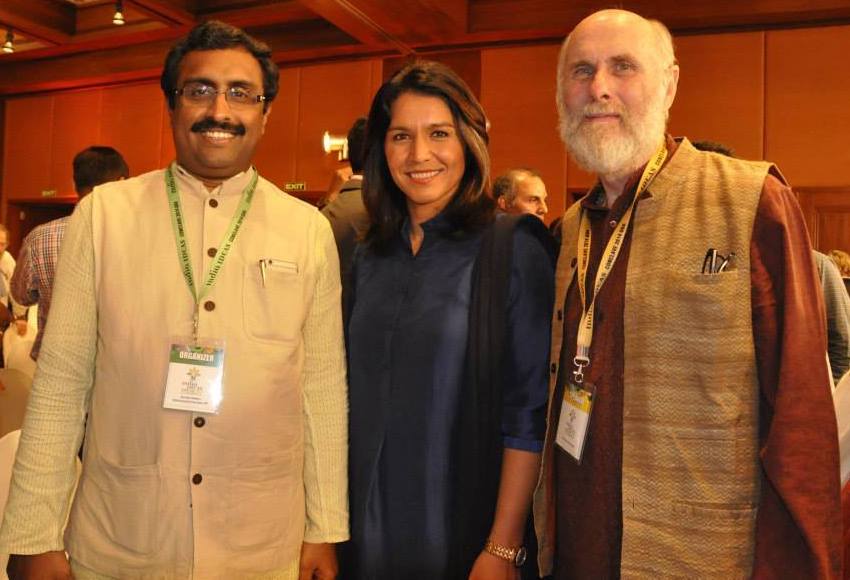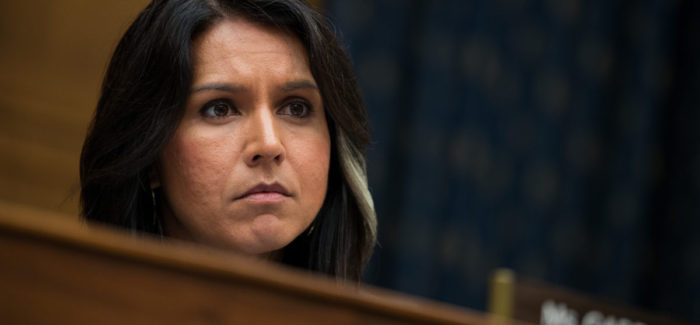Tulsi Gabbard: Hindu Nationalism About “Expressing Pride In One’s Religion”
Admin | On 15, Oct 2019
Congresswoman defends religious nationalism days after justifying 2002 pogrom
New Delhi: October 15, 2019 — US Congresswoman and presidential candidate Tulsi Gabbard, in a recent interview with The Times of India, defended the idea of Hindu nationalism by suggesting it is about “expressing pride in one’s religion.”
In January, Gabbard protested that she has “been accused of being a ‘Hindu nationalist’,” but she appeared to take a different approach in the October 13 interview. When asked about “the upsurge of Hindu nationalism and Hindu pride” displayed at the recent “Howdy, Modi” event in Houston, TX, she stated, “Hindu nationalism is a term that many people are using frequently without being specific about what they mean by that. Why is expressing pride in one’s religion a bad thing?”
Gabbard’s comments come just two weeks after she stirred controversy for apparently justifying a 2002 pogrom conducted against Muslims in Gujarat, India by militant Hindu nationalist outfits.
At an October 1 campaign event in Londonderry, New Hampshire, the presidential aspirant was asked about her relationship with Indian Prime Minister Narendra Modi. “Many consider him to be complicit in the deadly ’02 Gujarat riots,” an audience member said to Gabbard, who shot back: “Do you know what instigated those riots?” Her response was widely interpreted as a justification of the violence in Gujarat, which claimed approximately 2,000 Muslim lives.
In 2002, Human Rights Watch reported, “Communal violence against Muslims in Gujarat is intimately connected to a rise of Hindu nationalism.” Implicating the Rashtriya Swayamsevak Sangh and its affiliates as “directly responsible” for the killings, HRW explained that the RSS “has propagated a militant form of Hindu nationalism which it promotes as the sole basis for national identity in India.” In a February 2019 report, HRW warned, “The rise in Hindu nationalism in India since 2014, has fostered a climate of hate and discrimination against Muslims, Dalits, and other minority communities, leading to an increase in violent attacks against them in many parts of the country.”
Last year, a report from a Special Rapporteur for the United Nations Human Rights Council warned, “The Hindu nationalist Bharatiya Janata Party (BJP) has been linked to incidents of violence against members of Dalit, Muslim, tribal and Christian communities. Reports document the use of inflammatory remarks by BJP leaders against minority groups, and the rise of vigilantism targeting Muslims and Dalits.”
Gabbard’s association with Modi and the RSS has inspired strong criticism. After neglecting to join the BJP’s Modi at his September 22 “Howdy, Modi” event, she issued an apology. “I’m sorry that I’m not able to join,” said the congresswoman, but offered no comment about the estimated 15,000 South Asians who protested the event.
Later that week, she met Modi in New York City for their fifth meeting since 2014.
“Tulsi Gabbard’s defense of religious nationalism is an appalling attitude for a member of the US Congress, which we hope would represent and defend a secular, pluralistic society,” remarks Arvin Valmuci of Organization for Minorities of India. “Considering the congresswoman’s cozy relations with the Hindu nationalist BJP, it is not surprising she deliberately obfuscates the crystal clear definition of Hindu nationalism. She should be ashamed for excusing the violent ideology of Hindu nationalism as nothing more than being proud of one’s religion.”
In her Times of India interview, Gabbard further argued that there is “an unfortunate Hinduphobic approach taken to Hindus who are expressing their pride.” She claimed her political opponents are “resorting to these Hinduphobic attacks,” stating, “What concerns me is that it may discourage other Hindu Americans from running for office.”
“Absolutely nonsense,” said Dr. Ashok Swain. A professor of peace and conflict studies, he added, “The opposition to Tulsi Gabbard is not that she identifies as a Hindu American but because she acts as a stooge of Hindu Supremacist group RSS in the USA.”
Gabbard steps on to the national stage once again on October 15 as she joins 11 other candidates for the Democratic Party’s fourth presidential debate in Westerville, Ohio.
 Gabbard at India Ideas Conclave 2014 with BJP spokesperson Ram Madhav (L) and RSS apologist David Frawley (R)
Gabbard at India Ideas Conclave 2014 with BJP spokesperson Ram Madhav (L) and RSS apologist David Frawley (R)
